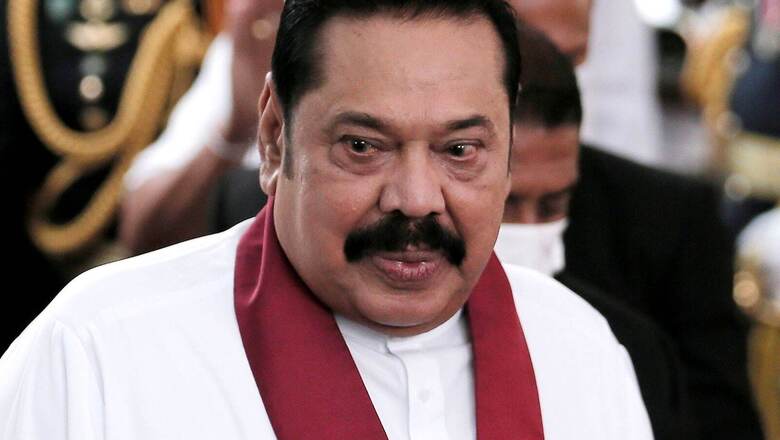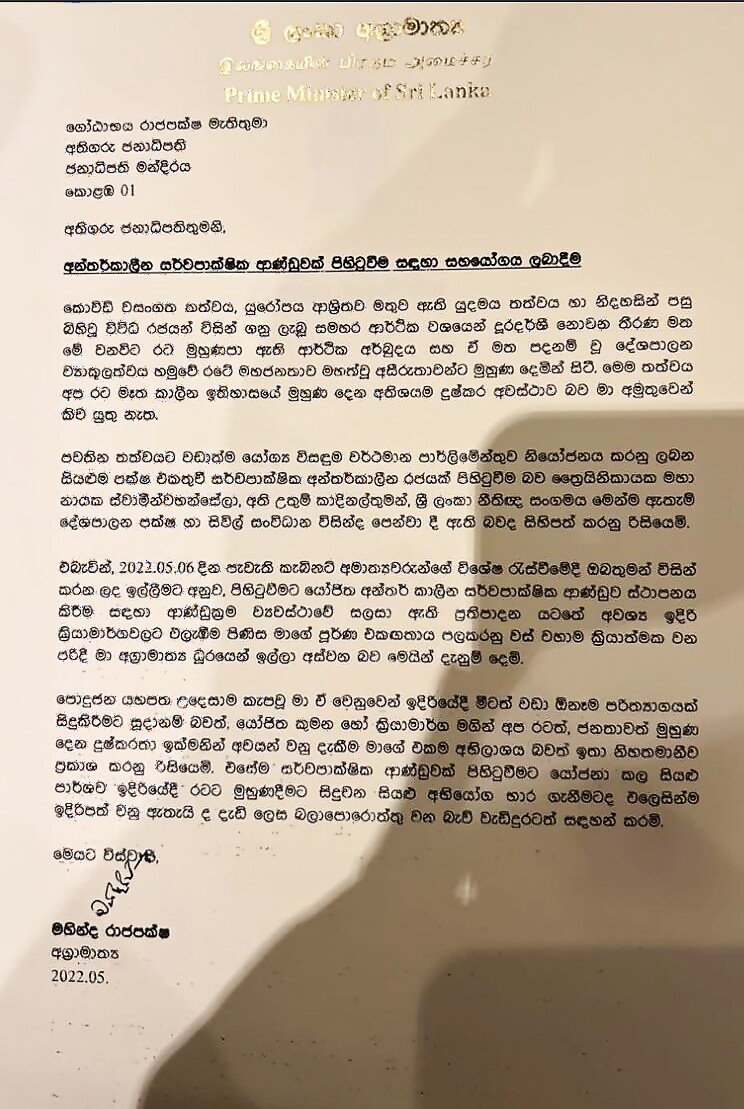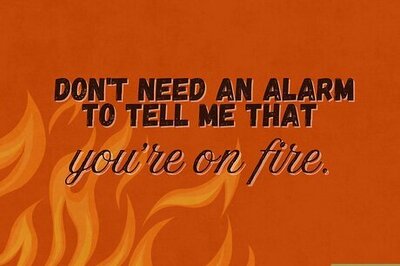
views
Sri Lankan Prime Minister Mahinda Rajapaksa on Monday resigned in response to the mounting demand for his ouster from the post due to the ongoing economic crisis. The announcement to step down came after violent clashes between his supporters and anti-government protesters left five, including one ruling party MP, dead and 200 injured, prompting authorities to impose a nationwide curfew and deploy army troops in the country’s capital city, Colombo.
The 76-year-old sent his letter of resignation to his younger brother President Gotabaya Rajapaksa clearing the way for a “new unity government”, spokesperson Rohan Weliwita said. Over the past two months, anti-government protesters at Galle Face in Colombo have demanded that the former president tender his resignation for his role in the current crisis.
“I am resigning with immediate effect so that you will be able to appoint an all-party government to guide the country out of the current economic crisis,” the prime minister said in the letter.

(Sri Lankan Prime Minister Mahinda Rajapaksa’s resignation letter to his younger brother President Gotabaya Rajapaksa. Image: News18)
The development comes as a surprise as earlier in the morning Mahinda expressed confidence that he will remain in his role despite the protests. His resignation automatically means the cabinet stands dissolved.
Five dead, over 180 injured
Police said the death toll had risen to five after a ruling-party politician opened fire on anti-government protesters, killing two and wounding five in the southern town of Weeraketiya. Earlier, a legislator, Amarakeerthi Athukorala, from Sri Lanka’s ruling party shot dead a protester and then took his own life in Nittambuwa. The MP’s bodyguard was also killed but it is not clear how.
The clashes took place outside President Gotabaya Rajapaksa’s office.
The violence occurred following reports that Mahinda may offer to stand down as PM, as pressure mounted on the embattled government to form an interim administration to overcome the worst economic crisis facing the country.
Curfew was imposed with immediate effect until further notice, a police spokesperson was quoted as saying by the local media. A military contingent was deployed to the protest site to assist law enforcement after clashes.
In a special cabinet meeting on May 6, President Gotabaya declared a state of emergency. This is the second time that an emergency was declared in Sri Lanka in just over a month.
Ancestral Home of Rajapaksas Set on Fire
The ancestral home of the Rajapaksas in Hambantota has been set on fire by a group of anti-government protestors. Video footage showed the entire house of Mahinda Rajapaksa and his younger brother and President Gotabaya Rajapaksa in Medamulana in Hambantota city was burning away as protestors hooted away, the Daily Mirror reported.
Mahinda’s House in Kurunegala was also set on fire by protesters while a mob also destroyed D A Rajapaksa Memorial – constructed in the memory of the father of Mahinda and Gotabaya – in Medamulana, Hambantota. Earlier, Mahinda’s supporters attacked anti-government protesters at MynaGoGama and GotaGoGama protest sites in Colombo. Several properties of ministers and lawmakers of the ruling coalition were destroyed by the protesters. Sri Lankan media also reported that a fire has broke out near the back gate of Temple Trees, the official residence of the Sri Lankan Prime Minister here.
Police water cannons have been called but anti-government protesters are attacking the vehicles, the report said. Protesters have also attacked the house of Badulla District parliamentarian Tissa Kuttiarachch and later set it on fire. The house of Puttalam MP Santha Nishantha was completely destroyed due to an arson attack.
Shots were fired from inside the Sri Lankan prime minister’s official residence Monday, as thousands of protesters breached the main gate and torched a parked truck, an AFP reporter said.
World Reacts
Foreign envoys in Colombo have reacted with shock and dismay.
Calling on the Sri Lankan government to conduct a full investigation, US Ambassador to Sri Lanka, Julie Chung, said the government must ensure the “arrest and prosecution of anyone who incited violence”. “We condemn the violence against peaceful protestors today, and call on the government to conduct a full investigation, including the arrest and prosecution of anyone who incited violence. Our sympathies are with those injured today and we urge calm and restraint across the island,” Chung tweeted.
Tweeting about the deteriorating economic situation in Sri Lanka, the UK embassy in Sri Lanka asked its citizens to avoid any demonstrations or large gatherings. The advisory said the UK’s citizens in Sri Lanka should avoid all protests and follow the advice of local authorities.
Sarah Hulton, the UK High Commissioner to Sri Lanka, strongly condemned the violence against peaceful protestors. Urging the authorities to safeguard citizens’ rights to protest peacefully, Hulton asked the government to “hold the perpetrators of violence to account”.
“Violence against peaceful protestors in Sri Lanka is unacceptable. Those responsible for attacks should be held to account,” she tweeted, adding that the fundamental rights, including the right to peaceful protest, must be protected as part of a democratic resolution to current economic and political challenges.
The European Union in Sri Lanka also called on the government to protect people and to “hold accountable those having instigated violence”. The EU encouraged all parties to “act with restraint and refrain from violence for the country’s interest”.
French Ambassador to Sri Lanka, Lavertu Eric, said he was “deeply shocked” and disturbed by the shameful and cowardly attacks on peaceful protesters. Urging the government to safeguard the rights of the people of Sri Lanka, the French ambassador tweeted that the political leaders should “ensure peace and justice”. He said that he believed in the wisdom of the people to overcome this pathetic situation that has engulfed the country.
Similarly, Holger Seubert, the German Ambassador to Sri Lanka, called on all sides for calm and restraint. The current “developments hurt my heart”, Seubert said, adding that the country, which used to be an example of a well-functioning democracy where people peacefully exercised their right to free speech, had turned into a tense confrontation.
“I call on all sides for calm and restraint. Violence is no solution, to neither side!” the ambassador tweeted. Hanaa Singer-Hamdy, UN’s resident coordinator in Sri Lanka, expressed concern about the tense situation prevailing outside the ‘MainaGoGama’, a protest site near Temple Trees, the official residence of the Prime Minister.
She condemned the “violence that risks further escalation”, she said. “Police should protect peaceful protesters and use new emergency powers with restraint. Peaceful protests and dialogue are important to find a legitimate resolution to the current crisis,” she stressed.
“Every day people have suffered immensely owing to the economic crisis. The crisis has also brought together people from all ethnicities and religions behind a common peaceful cause. I hope their efforts can continue,” the coordinator in Sri Lanka added.
For The Unversed
Thousands of demonstrators hit the streets across Sri Lanka since April 9 seeking the resignation of President Gotabaya and Prime Minister Mahinda as the country is currently in the throes of unprecedented economic turmoil caused in part by a lack of foreign currency, which has meant that the country cannot afford to pay for imports of staple foods and fuel, leading to acute shortages and very high prices.
The government ran out of money for vital imports; prices of essential commodities have skyrocketed and there are acute shortages in fuel, medicines, and electricity supply. President Gotabaya Rajapaksa in a special Cabinet meeting on Friday declared a state of emergency with effect from Friday midnight. This is the second time that an emergency was declared in Sri Lanka in just over a month as the island nation was in the grip of the worst economic crisis.
Sri Lanka is facing its worst economic crisis since gaining independence from Britain in 1948.
(With inputs from agencies)
Read all the Latest News here
















Comments
0 comment